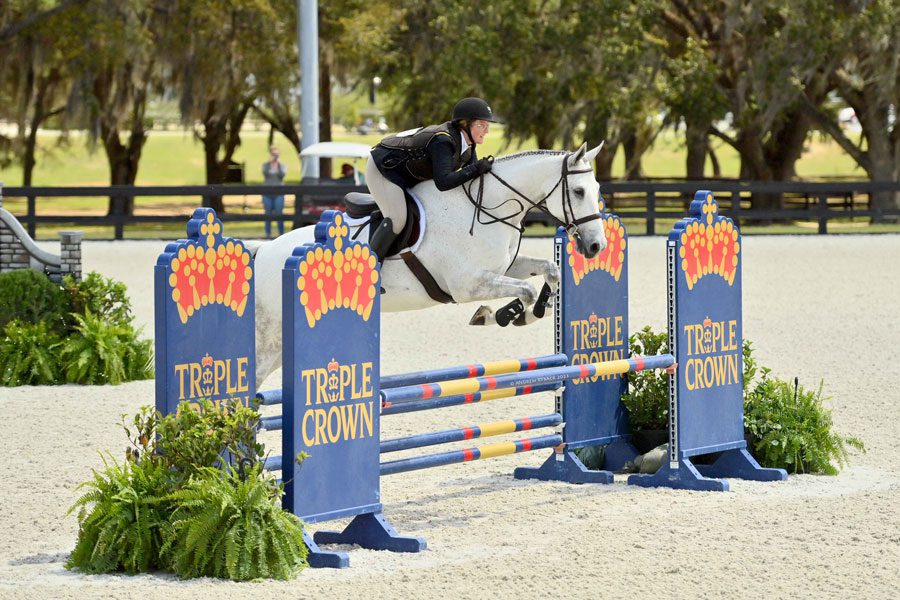As a psychologist, one of the things I pride myself in the most is providing a safe and judgement-free space, where I can help my clients better understand anxiety, fear, and panic and how our brains and bodies go into fight or flight (or freeze) mode when we perceive danger. I will explain how their reactions of fear and anxiety are nothing to be ashamed or embarrassed of, but simply a way our minds are trying to protect us. These emotions are very common.
In my day to day life, I’ve struggled with my own anxiety, and have worked hard to get it under control. However, as a competitive equestrian, fear and I have a much more intimate relationship and I have found it is slightly more difficult to rein in! I recently experienced firsthand just how hard it is to keep your brain thinking rationally and your body cooperating when your fear is through the roof.

Several months ago, I was offered a (new to me) horse named Nate, to ride and compete with at horse shows. While I have spent most of my time in hunter and equitation rings which reward style and an even pace, Nate excels in the jumpers. The jumpers involve speed, quick turns, and more complex courses of jumps, which require the horse and rider to go and think much faster. The jumps are also built a bit bigger in the jumper ring. Very much outside my comfort zone.
The first weekend I showed Nate, I found myself in the jumper ring, facing some courses that were within my ability level, however I was very nervous, because I know myself and I know my confidence sometimes doesn’t match my abilities. My automatic (scared and mostly negative) thoughts were about how big the jumps looked and I questioned my ability to do it. Moreover, sometimes Nate jumped extra high and I felt like I was going to fly right off of his back! And while I was stuck in my own head worrying about every little thing, before I knew it, I was immediately at the next jump only hoping to stay in the saddle! As an “older” adult rider, staying on the horse is of paramount importance, so if I feel that I am loosing my control over a jump and can’t get myself into a position to feel secure, I panic.
That weekend, there were two occasions where Nate took a very big jump, and I thought I was going to fly off his back and lose my nerve going to the next jump. I could hear my coach encouraging me to get back to jumping and to go faster. My coach knows that when Nate goes faster, he doesn’t jump as high, meaning I am more likely to stay on. Mind you, by halfway through the course, my heart was beating a million miles a minute. I was a bit winded, the timer was still going, and the internal thoughts of,”go-don’t go”, “can I do this and will I fall”, were raging. I was getting yelled at to kick and go faster, and my brain just short-circuited.
We know that in the moment of a dangerous situation or high anxiety moment, we go into survival mode. When this happens, rational thinking becomes all but impossible. shuts off our ability to really utilize the thinking parts of our brain, and that is exactly what happened to me. When I came out of the ring, my coach asked me what I needed from her. I told her that I just needed a minute to settle down, catch my breath, and get my brain back online. I mostly knew the mistakes I made that led to my feeling insecure on Nate’s back, and I was surely open to some pointers from my coach. But before I could process that information, I needed to take a minute to take some deep breaths and give my brain a chance to settle down and get back online so that I could reset, get needed coaching, and try again.
This experience brought home to me just how real anxiety and panic are and how they have a thought part, a feeling part, and often physical sensation that goes along with them. When your brain perceives that you are in danger, it’s hard to think rationally, no matter how much you know about anxiety from a professional standpoint.
I shared this experience, because I believe it can help others understand what so many of my patients, friends, and family experience in life. Something will happen, and their anxiety will go through the roof, and they just can’t think. We have to remember that when people are experiencing anxiety or panic, they are not being uncooperative or unresponsive on purpose. Their ability to think may literally be shut down! They need time, empathy and patience.
It’s one thing to provide information and therapy to patients, and it’s another to experience it firsthand. This experience has elevated my ability to relate to my anxious patients and have even more empathy for what they are going through.
If you are struggling with fear, anxiety or depression and you find your own mind “shutting off” often when you are in a certain situation, a therapist at Rice Psychology Group can probably help. Contact us today and schedule your free, 10-minute consultation. I look forward to getting to know you, learning your story and working with you to live your best life.
PS – We are pretty good at helping both kids and adults manage their anxiety.

